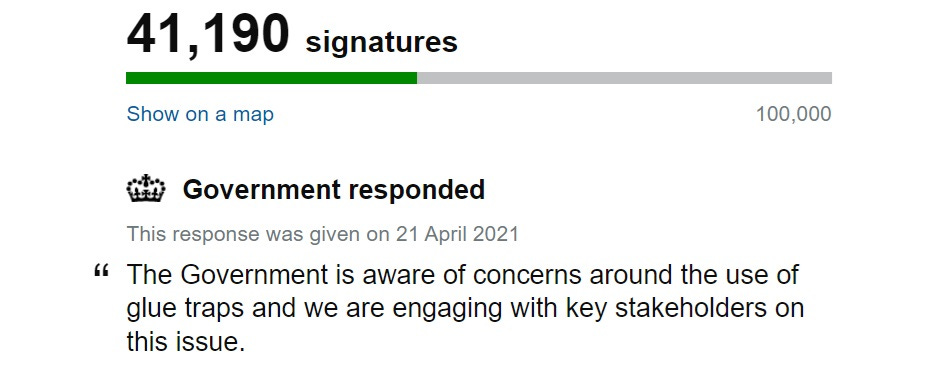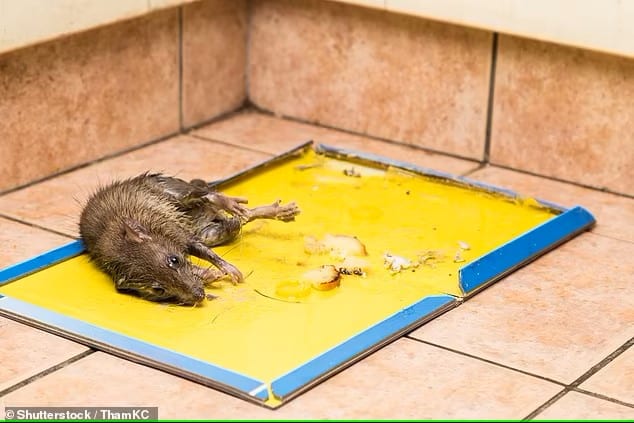Glue traps, sometimes referred to as sticky boards or glue boards, are used to trap mice or rats. Non-drying adhesive is placed on a board and as animals walk across them they are trapped and unable to escape, their fur or limbs becoming increasingly stuck to the glue as they try to wriggle free.
Thankfully countries across the UK have increasingly banned them on animal welfare grounds. Most animals caught in traps are protected under the Animal Welfare Act 2006, which makes it an offence to inflict “unnecessary suffering” on them – anyone using glue traps previously risked the possibility of being charged for breaches of animal protection legislation anyway – but clearly stronger legislation banning public use was required:
- Wales passed the Agriculture (Wales) Bill in 2023, making Wales the first UK nation to introduce a full ban on glue traps.
- The Wildlife Management and Muirburn (Scotland) Bill passed into law in March 2024 and included a ban on the purchase and use of glue traps.
- In England, the Glue Traps (Offences) Act 2022 (originally introduced as a Private Member’s Bill by Jane Stevenson MP on 16 June 2021) banned the use of glue traps but gave users and suppliers of glue traps two years in which to finish off their existing stock and move to alternatives. In the same period a licencing scheme was developed which was finally announced by Natural England and the Department for Environment, Food & Rural Affairs on 19 June. From 31 July 2024, though, it will be against the law in England to use glue traps to catch rodents, unless an operator has a licence issued by Natural England.
Licences will be issued to professional pest controllers for the purpose of preserving public health and safety. Glue traps will only be permitted for use in exceptional circumstances where there is no alternative satisfactory solution.

Photo by Joshua J. Cotten on Unsplash
Why are they being banned?
Glue traps are being banned because they cause immense suffering, are indiscriminate, and are ineffective.
Despite being once widely available to the general public, glue traps don’t actually kill the animals they catch, which leads to clear and obvious welfare and cruelty issues. Nothing more than a glue-covered board, they are convenient to use but they don’t have springs or bars to kill the trapped animal quickly. Instead, animals that are trapped on them (and whatever people may think about rodents they are sentient) starve, dehydrate or suffocate to death – often after many days of suffering.
Some brands of glue trap intended for home use actually recommend that ‘used’ boards are thrown into a rubbish bin while the animal is still alive because they know that some householders will be too squeamish to kill them outright.
Glue traps are also utterly indiscriminate: whatever comes in contact with them gets stuck. There are numerous reports every year of animals – including protected and endangered species like hedgehogs, wild birds and bats – being caught and suffering often fatal injuries. In one renowned incident in the UK a cat nicknamed Miles by RSPCA staff had to be put to sleep after being trapped on four glue boards and suffering severe injuries.
On top of clear welfare issues, glue traps are not an effective long-term solution to removing unwanted house guests anyway. Perhaps in the very short term they are a quick – but very cruel – fix, but while glue traps are effective at catching individuals (or even a few animals) mice and rats are experts at seeking out food, shelter, and suitable breeding habitat. It is far more humane and far more effective to remove food sources and block access to (or ‘rodent proof’) buildings etc. Without doing that other animals will soon move into the vacated territory and the perceived problem just starts up again.

Make glue traps illegal within the UK, Petition from 2021 (now closed)
The ban has been welcomed by organisations and parliamentarians alike.
Despite this, the clear animal welfare issues, and the alternatives available, not everyone agrees with the legislation. In a post last month on ‘Pest’ (which apparently delivers ‘a mix of unbiased news, impartial advice and topical technical features for pest professionals in the UK and internationally’) the managing director of Harvey Environmental Services said that the ban on glue traps in England “will cripple hospitality and retail sectors” and that the ban seems to put the health of rats and mice ”above that of human beings”.
Protect the Wild would contend that rather than putting the health and welfare concerns of one species above another, the legislation is simply recognising the bleeding obvious – that other species suffer too and that we have a moral responsibility to stop causing those species to suffer as much as we possibly can.

